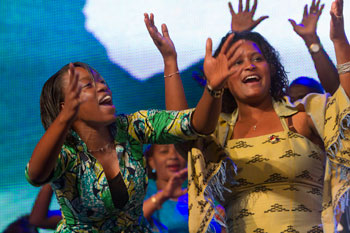Yesterday was a day off. Participants took the opportunity to climb Table Mountain, take the ferry to Robben Island, visit a winery, walk around the city or just sleep! It was a refreshing break in the midst of a busy schedule.
So today marks the halfway point of the Congress and it was wonderful to be encouraged by the teaching of Vaughan Roberts (another GAFCON speaker) from St Ebbe's Oxford on Ephesians 4:1-6. He addressed the importance of the God-given gift of unity, which we do not create, but are charged with the responsibility of maintaining, Unity in Christ is enhanced by the gifts of Christ, especially the word ministries of apostles and prophets (foundational gifts grounded in propositional revelation) and the superstructure gifts of evangelists, shepherds and teachers. He gave special attention to the importance of recruiting and training the next generation of shepherds and teachers.
Unreached people groups
The next session was devoted to unreached people groups. Under the general theme of priorities, mention was made of Ralph Winter's seminal address at Lausanne 1974 where he challenged that Congress to consider the 60 percent of the world's population who live within unreached people groups. At that time most of the church's mission resources were directed to countries where the gospel had been available for many years. Winter's challenge changed the face of the modern missionary movement, so that 35 years later this statistic has been reduced to 40 percent.
Yet 40 percent is still a large number, which equates to 3,700 people groups. The world has 3.5 billion people who are Muslim, Hindu or Buddhist, and 85 percent of them do know a person who is a believer. Of the 8,000 languages in the world, only 400 have the Bible in their own language, over 800 have some books of the Bible, but over 2,000 languages have not one Scripture verse in their own language.
Picture: Worshipping in Cape Town

A global Connect09?
Paul Eshleman, the founder of the Jesus Film Project, then encouraged all the participants to make a commitment towards reaching one of the unreached people groups. The commitment ranged from being an intercessor to going as a missionary to an unreached people group, and everything in between.
In many ways this was a global model of what Connect09 (now Connect for Life) has been in Sydney, where we have been seeking to reach local 'tribes and deserts' (the unreached or unengaged peoples on our door step), Some helpful practical suggestions were placed before the participants, for example: inviting a Muslim, Hindu or Buddhist to your home or for a meal; visiting a Muslim mullah, Hindu priest or Buddhist monk to express friendship; sponsor training for those planning to engage in mission work with unreached peoples. These examples could be easily modified to those of no faith within our own Australian communities.
One of the leaders of the Lausanne Movement shared a question with the Congress that he had asked of the executive leadership two years ago: How would you finish the sentence, 'Lausanne III will fail if.' The most frequent answer was: '.if the participants do not make a commitment to do something.' In this session the invitation to make a commitment was on the table and the participants were asked to respond prayerfully and sincerely. This was not planned to be a conference where you return home and continue on as if nothing had happened, other than having attended another conference!
Soccer and Africa
The evening session was again devoted to snapshots of God's work in the world with a special focus on Africa and children and youth.
This allowed us to experience some characteristic African praise sessions with vibrant singing and dancing. We also heard that one hundred years ago Africa was a missionary receiving continent, but now it is a missionary sending continent. In a moving and symbolic act all westerners were then asked to stand so that the rest of the Congress could thank them (representing their forebears) for sending missionaries to Africa, often at the cost of their own lives.
In Africa 50 percent of the population is under 25 and 33 percent is under 15.
While young Africans are vulnerable to being recruited to local militia or enticed into antisocial behaviour, soccer has been used as a tool for engaging with young people. Christians have been trained as soccer coaches, but have also taken on the role as life coaches so that through these sporting contacts the good news of Jesus can also be explained and embraced. This has proved to be a very successful strategy across various nations in Africa.
Much to think about and much to reflect upon.
(Pictures: Lausanne 2010 [url=http://www.lausanne.org]http://www.lausanne.org[/url])





















